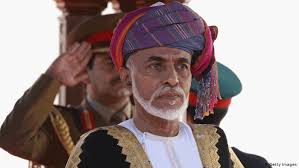Why India mourns the passing away of Sultan Qaboos bin Said Al Said
Throughout it all Sultan Qaboos kept Oman, home to a multitude of ethnicities and religions, a haven of stability and tolerance in a region (in)famous for its volatility.

By Aditi Bhaduri
Today, January 13, 2020 is a day of state mourning in India as a mark of respect to His Majesty Sultan Qaboos bin Said Al Said, who passed away on 10 January 2020. “I am deeply saddened to learn about the passing away of His Majesty Sultan Qaboos bin Said al Said. He was a visionary leader and statesman who transformed Oman into a modern and prosperous nation,” Prime Minister Modi wrote on Twitter. Sultan Qaboos was a true friend of India and provided strong leadership for developing a vibrant strategic partnership between India and Oman, he said.
Around this time some six years ago a group of Brahmins from Karnataka were performing a havan in Oman for the health of the now late Sultan who had reportedly been suffering from some kind of cancer. In itself the news may have been innocuous but these priests had been guests of the Sultan himself. Alongside of course, the thousands of Indian expats – Oman hosts a 700,000 strong Indian expat community – working in the country had been praying for the Sultan’s recovery, just as thousands are now mourning his passage. In a region rife with every kind of religious strife, where even being ‘Muslim’ is not good enough – one had to belong to the ‘right’ sect, such was the religious pluralism that the Sultan had embodied. Under his rule Oman has been a beacon of light, pluralism, and peace.
Oman’s quiet low-profile individuality has for decades distinguished it from the others of the region. The country’s geographical location makes it a natural bridge between the Arab world and Iran. Oman is isolated from much of the Arabian peninsula by a formidable mountain range, while Iran is just across the narrow Strait of Hormuz. Given the current crisis in the region, this is important. Oman thus becomes a kind bridge between the Shia and the Sunni world, helped by the fact that the majority of Oman’s Muslims, including the late Sultan, are followers of the Ibadi sect of Islam, which predates both the Sunni and Shia sects. Perhaps that is why Oman has distinguished itself by its independent foreign policy and role as an intermediary.
While Oman’s role in facilitating US-Iran talks that led to the nuclear deal stands out the most, it has numerous other feats to its credit – thanks to the sagacious decisions of the late Sultan. Oman in 2014 became the first Arab country to which Iranian president Hassan Rouhani paid an official visit. Sultan Qaboos bin Said Al Said can be credited with conceptualizing a gulf security alliance that later found expression in the GCC. Oman publicly supported Anwar Sadat’s peace overtures to Israel and was one of the only three Arab states that continued diplomatic relations with it after it recognized Israel. It then went on to play host to Israeli Prime Minister Itzak Rabin to Oman–the first public visit by an Israeli leader to an Arab Gulf state. More recently in 2018 Oman officially hosted Israeli Prime Minister Benjamin Netanyahu and his wife with a delegation of several ministers in Muscat. During the Iran-Iraq war Oman maintained relations with both states and tried, albeit unsuccessfully, to bring both to the negotiating table.
It is also instructive, that Oman has a track record of being a hostage negotiator. Wikileaks disclosed US diplomatic cables which say that Oman helped free British sailors captured by Iran’s navy in 2007. In 2010 it helped free American hikers held by Teheran and in 2011 facilitated the release of three French Aid workers held hostage by Al Qaeda militants in Yemen.
More recently, in the aftermath of the assassination of top Iranian General Qassem Soleimani and tit for tat attacks by Iran on US military bases in Iraq, Oman had called for dialogue between the US and Iran to ease tension between the two countries.
Closer home the late Sultan had been the architect of the India-Oman strategic partnership. The Narendra Modi led NDA government began its West Asian diplomacy during its first tenure by playing host to the Omani foreign minister Yousuf bin Alawi bin Abdullah. Under the late Sultan bilateral ties had blossomed. 770,000 Indians have made Oman their home, sending back $3 billion in annual remittances. There are Indian families living in Oman for more than150-200 years. The India-Oman defense cooperation has also been institutionalized through joint naval and air exercises. Oman is one of India’s top trading partners with bilateral trade reaching 5 billion US dollars in 2018. Oman is also looking towards Indian expertise in IT, education and knowledge industry. Numerous high profile bilateral visits, including that of Prime Minster Narendra Modi to Oman in February 2018 and the more recent visit by External Affairs Minister S. Jaishankar, have characterized the relationship.
Throughout it all Sultan Qaboos kept Oman, home to a multitude of ethnicities and religions, a haven of stability and tolerance in a region (in)famous for its volatility. The Basic Law of Oman recognizes the right to different forms of worship. The Hindu merchant community has two temples, including one over a century old, and their own cremation grounds. Churches have been permitted and a Gurudwara has been there since over two decades, along with at least two other temporary structures, which are used as Gurudwaras without being objected to by the local authorities. It is therefore a matter of pride for us in India that the Sultan had had his early education in India. And that legacy can be seen in the mourning of Indians for the Sultan.